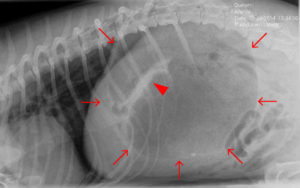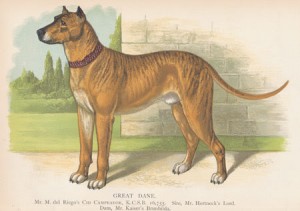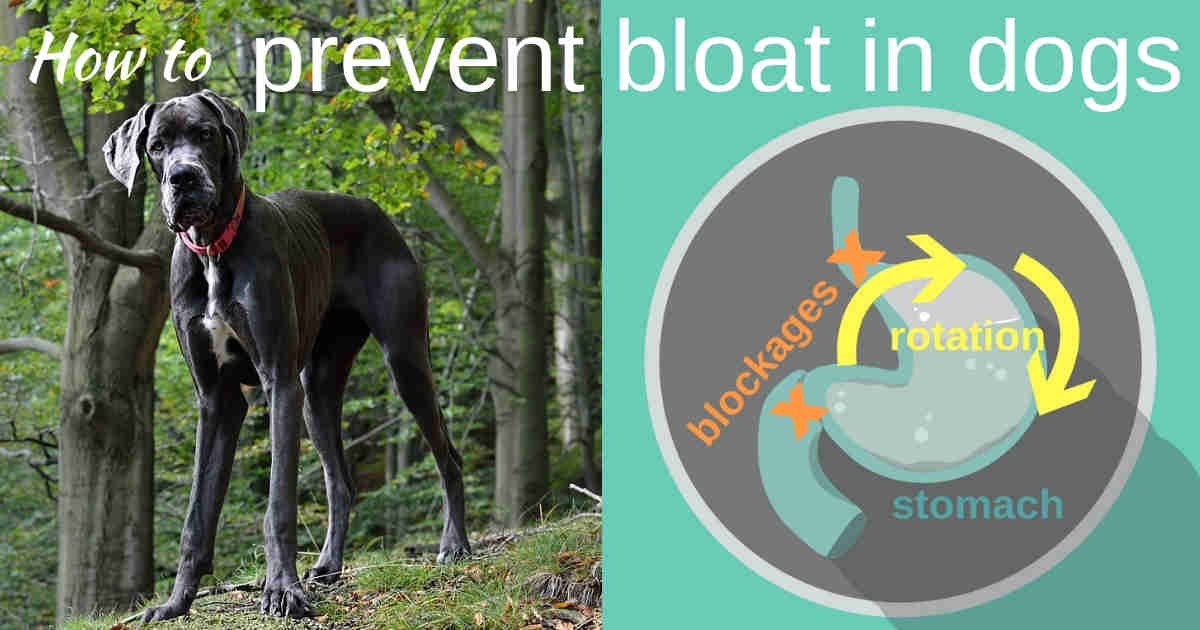Updated November 28, 2020
Emergency care (details below)
How To Recognise & Treat Bloat
- Retching, distress and a large, hard belly are signs of bloat
- Travel to an emergency vet as fast as is safe to do so
- Any delay in treatment reduces the chance of survival
Now dive deeper…
When a dog’s abdomen suddenly enlarges, it can be one of the most serious emergencies of dogs. Therefore, if your dog is in distress, stop reading this and get to a vet straight away. Their life may depend on it.
There are a lot of other causes of an enlarged abdomen in dogs that you can read about at the link. This page is your evidence-based guide to bloat and how to prevent it.
What Is Bloat?
Bloat, also called Gastric Dilation Volvulus or GDV, is when a dog’s stomach both enlarges and rotates on its axis, blocking the outlets. Accumulation of trapped gases then causes the stomach to swell rapidly and put pressure on the surrounding organs and blood vessels.
Bloat is a true emergency with the same urgency as snake bites and poisonings. Rapid recognition and treatment of the problem gives good results, but delays are fatal.
What Causes Bloat?
Although it isn’t fully understood, bloat happens when:
- The stomach is unusually full
- The supporting ligaments are weakened
- The dog’s chest shape allows rotation
In other words, it’s more common after eating in certain breeds at a mature age. Those with a narrow and deep chest are at a much higher risk.
In large and giant breeds, bloat is the second most common cause of death after cancer. On average, one in six will be affected with a case mortality rate of between 30 and 50% depending on the study.
The risk varies greatly with individual breeds, reaching almost 50% in Great Danes. Here is a list of the dog breeds commonly reported to be prone to bloat:
- Akita*
- Basset Hound
- Chow
- Doberman
- Dogue de Bordeaux
- German Shepherd
- Great Dane
- Irish Wolfhound
- Rottweiler
- Saint Bernard
- Setters (all)
- Standard Poodle
- Weimaraner
Any large and giant breed can get it, even Labradors and Golden Retrievers. I have also seen it in a Miniature Dachshund.
* probably the American form
What Are The Signs Of Bloat?
Bloat normally happens within several hours of a meal, making it a classic nighttime emergency. Signs include:
- Restlessness, pacing and signs of discomfort
- Drooling and retching without producing food or bile
- Panting or rapid breathing
- A large or tight belly
What distinguishes bloat from just an upset tummy is the obvious distress of your dog. Most dogs with gastro still act normally between vomits but a bloated dog is totally focused on the problem. Whether it’s bloat or not, this is always a sign to seek emergency help.
Treatment Of Bloat
There is no home treatment of bloat, and it almost never resolves on its own. Time is critical. The expanding stomach is in danger of being irreversibly damaged as well as obstructing the major abdominal blood vessels.

After diagnosing bloat via an x-ray, your vet will immediately place a drip and attempt to pass a stomach tube. Whether this is done under sedation or anaesthetic depends on the state of your dog.
In most cases, the tube cannot pass into the twisted stomach and urgent surgery is required. This allows the stomach to be de-rotated and decompressed. After this, the surgeon will surgically fix the stomach in its normal position in a procedure called gastropexy.
A recent study showed that 80% of dogs that have bloat surgery will survive.
How To Prevent Bloat In Dogs
Evidence-based ways to reduce the incidence of bloat are based on how you feed large dogs:
- Feed multiple smaller meals per day instead of one large meal
- Use ‘slow feeder’ bowls or treat dispensers for dogs that eat quickly
- Food bowls should be at floor level, not raised.
- Avoid higher fat dog foods
- Table scraps reduce the incidence, suggesting that ‘natural’ diets may help
- Feeding dry or wet food makes no difference
There is also weak evidence that avoiding exercise straight after feeding may be helpful. None of these methods is going to reduce the risk to zero, but you can make a big difference.
Other factors that influence the risk of bloat are:
- Health: dogs with prior medical or digestive problems are at higher risk
- Stress: strangely, stress makes dogs more likely to bloat
- Body condition: very lean (skinny) dogs get bloat more often
- Surgery: gastropexy surgery is extremely effective protection once a dog has already had bloat
- Genetics: the most important, but the one you can’t change once you’ve selected that puppy
Breeding To Prevent Bloat

So let me finish by talking frankly about the breeding issue. Bloat today is five times more likely in a pure-bred than a cross breed. You saw the picture of the Great Dane earlier. Now, look at the chest shape of a Great Dane from 100 years ago. I’ll bet you that this dog hardly ever got bloat.
However, this isn’t the only breed at risk.
One of the greatest predictors of whether a dog will get bloat is whether it happened to a close relative. Unless breeders are actively choosing dogs from lines that don’t bloat we can’t fix the problem. That will also require kennel clubs to stop giving prizes to dogs with the long narrow chests.
And it will take pressure from puppy buyers asking breeders if any of their dogs have bloated. It’s frankly scandalous that preventative bloat surgery is now considered a normal part of owning some breeds. You may also need to learn to love the shape of dogs they way they were meant to be.
But of course you will!
Have something to add? Comments (if open) will appear within 24 hours.
By Andrew Spanner BVSc(Hons) MVetStud, a vet in Adelaide, Australia. Meet his team here. The information provided here is not intended to be used as a substitute for going to the vet. If your pet is unwell, please seek veterinary attention.


Hi Andrew, I just came across your article by chance, we lost our beloved Mastiff just over a week ago to bloat while being ‘cared for’ by a local ‘dog trainer’. We are still in shock and are at a loss to really understand how this could happen especially to such a young dog
I just wanted to thank you and you’re team for such educational articles.
Thanks Will. I hope the article helped.
I hope you and those you love, human or animal, will have a Happy Christmas.
Thank you for your email each week. I usually read everything you post, even though I don’t have a cat, just an old darling dog.
Marilyn Linn
Thanks Marilyn! Words of appreciation like yours are great inspiration